
Hantavirus
Camping or staying in a rustic cabin makes for a lovely and inexpensive trip. But you’ll want to take care, warns head surgeon David Greuner, MD, with NYC Surgical Associates: If you’re staying in a cabin or campsite where rodents come and go, you’ll need to take extra care to avoid hantavirus—a dangerous, and potentially fatal disease spread from the urine and feces of mice and rats. “Just sweeping it away out of sight isn’t enough—it can still spread. You need to get gloves, bleach, and a mask to get rid of it properly,” he advises. Hantavirus is especially a concern in the American southwestern states of New Mexico, Colorado, Arizona, and California. Check out the strangest animal found in each state.
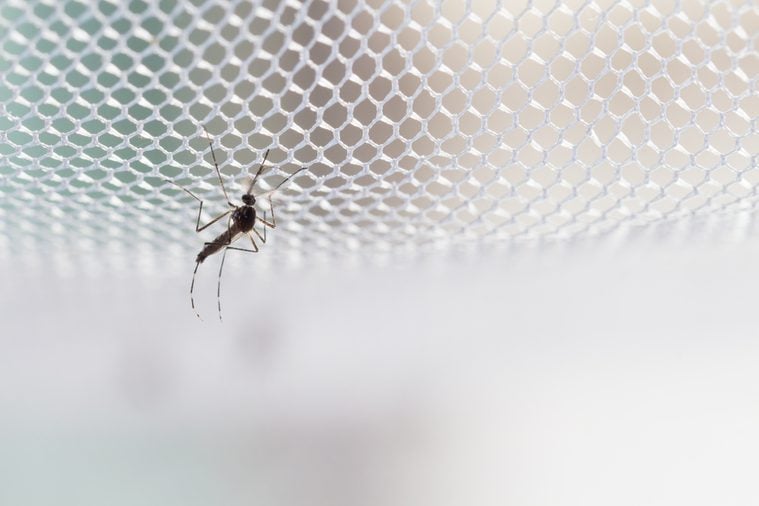
Malaria
Spread by mosquitoes, malaria spells trouble for natives and travelers who venture into endemic areas. According to Thomas M. Miller, MD, professor of medicine and director of the UNC Internal Medicine Travel Clinic, people heading to Africa, Central or South America, and much of India and Southeast Asia, should definitely carry prophylactic malaria medications. The best way to avoid infection is to avoid getting bit. The Anopheles mosquito that carries malaria is most active at dusk and dawn. Use mosquito netting and bug spray—and wear long pants and long sleeves during those hours. Here are 9 things mosquitos absolutely hate.
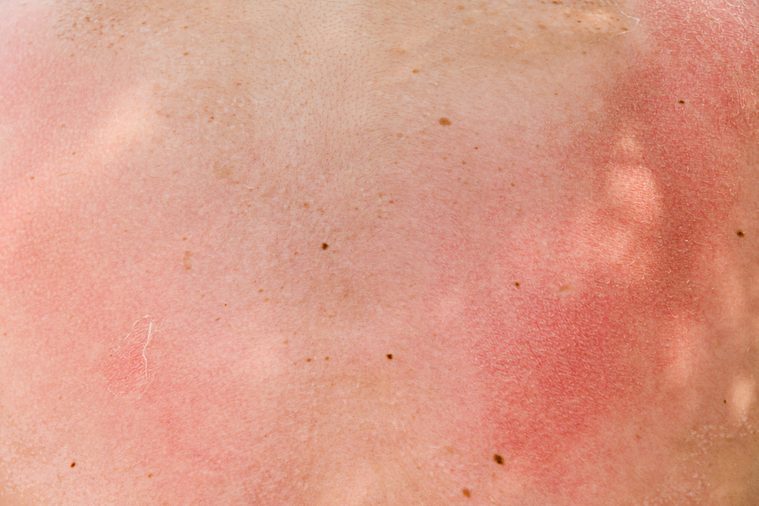
Skin cancer
This is the most common cancer going—more prevalent than breast, prostate, or lung. As dermatologist Paul S. Yamauchi MD, PhD, says, the more you’re exposed to the sun, the more important it is to take necessary precautions to protect yourself. In addition to sunscreen, he says, be mindful of medicines that could cause photosensitivity—these include commonly prescribed drugs like blood pressure meds and certain antibiotics. “Wear sunscreen and protective clothing to prevent photosensitivity from happening and seek medical attention if the burn is severe,” he advises. If you’re going to be spending a lot of time in the sun, here’s what you need to know about skin cancer.
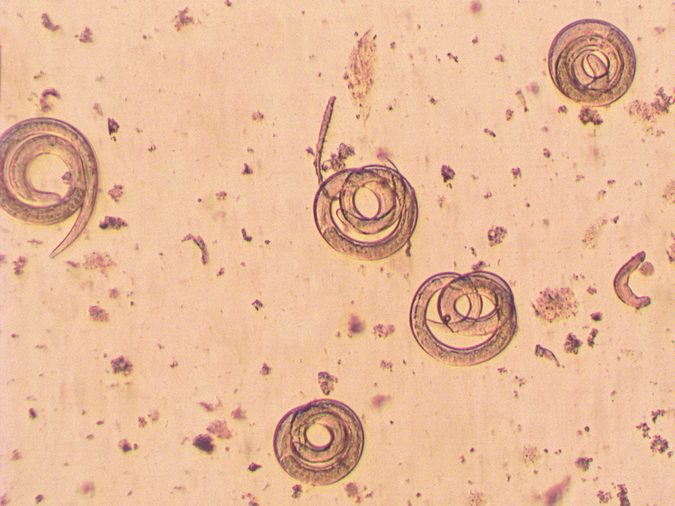
Schistosomiasis
This disease is caused by parasitic worms, and if that’s not sickening enough, consider this, says Constantine George, MD, the chief medical officer of Epitomedical, a healthcare company: Most people don’t even realize they’ve been infected as the worms colonize your liver, intestine, bladder, and other organs. The early symptoms include itchy skin, fever, chills, cough, and muscle aches—they all stem from your body’s reaction to the worm’s eggs. People pick up the worms from contaminated freshwater in parts of Africa, South America, the Middle East, Asia, and the Caribbean. There is no vaccine or preventive medicine—so watch where you take a dip. “If you have to use fresh water to bathe, treat it one of three ways,” advises Dr. George: “Filter the water with fine mesh filters, heat bathing water to 50 degrees Celsius for five minutes to kill the parasite, or keep water in a storage tank,” he advises. “If you believe contaminated water got on your skin during your trip, contact your doctor immediately about getting tested and treated.” Don’t miss the 8 silent signs you could have a parasite.
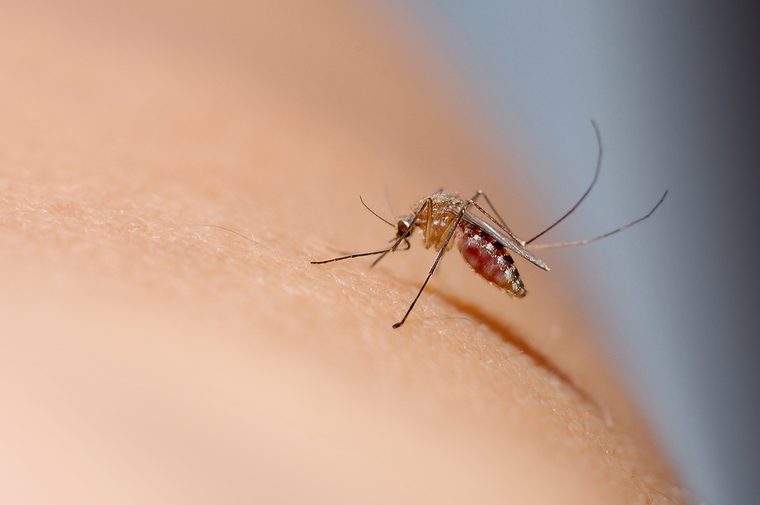
Dengue fever
Most people don’t realize that dengue fever—also known as breakbone fever—is a danger on beautiful beaches throughout the Caribbean, Central and South America, the Western Pacific Islands, Australia, Southeast Asia and Africa. According to Yesim Tozan, PhD, a clinical associate professor at the department of global health and public policy and management at NYU, 128 countries carry this risk. As a mosquito-borne viral infection, dengue may trigger severe symptoms or none at all: “Although it is rarely fatal, dengue in travelers can be incapacitating; it can disrupt travel, result in hospitalization, and even require evacuation home. Dengue illness is the second most frequent cause of hospitalization—after malaria—among travelers,” explains Tozan. While there are no antiviral drugs or vaccines for dengue, Tozan recommends using bug spray, wearing long-sleeved clothing, and sleeping in air-conditioned or screened-in rooms. Dengue is just one of the 7 scary diseases you can get from a mosquito bite.
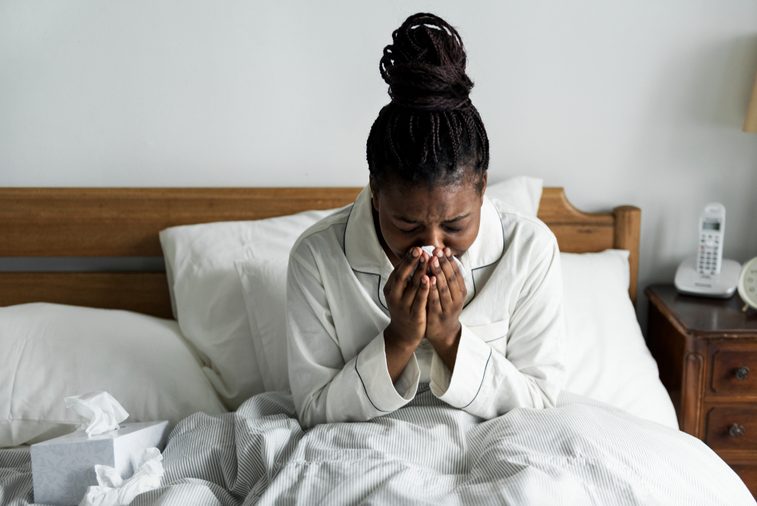
Influenza
We tend to focus on flu “season,” but that can be year round, depending on where you’re traveling, warns Dr. Miller. The GeoSentinel Clinics collect data on illnesses in travelers and have discovered that influenza is the most common preventable illness—all it takes is a vaccination. In the United States, influenza hits during winter months and is largely absent at other times of the year, explains Dr. Miller. In the southern hemisphere, it’s the same, but that means our summer months. “In the tropics, the flu can be spread at any time of the year but typically does not cause epidemics,” he shares. You’re most at risk when you’re at an airport or other large enclosed, busy areas; stay safe by getting a flu vaccine a couple of weeks prior to liftoff. And FIY: This is the germiest spot on an airplane.

Traveler’s diarrhea
Dr. Miller estimates that up to 40 percent of travelers will experience this uncomfortable and relentless illness when they travel to underdeveloped countries. Food prep—or the lack thereof—is the issue: Improperly cleaned vegetables or fruit, poorly cooked meats, and drinking contaminated water can be the source. You might experience between four to five days of diarrhea and expect some abdominal cramping. “Mild cases can be treated with over the counter Pepto-Bismol or Imodium,” says Dr. Miller. “For more severe infections, antibiotics—usually just a single dose—taken along with Imodium can often shorten the illness to just 12 hours,” he notes. If it persists, see a doctor; dehydration could be a risk. These are the 10 first-aid essentials you absolutely need to bring with you on vacation.
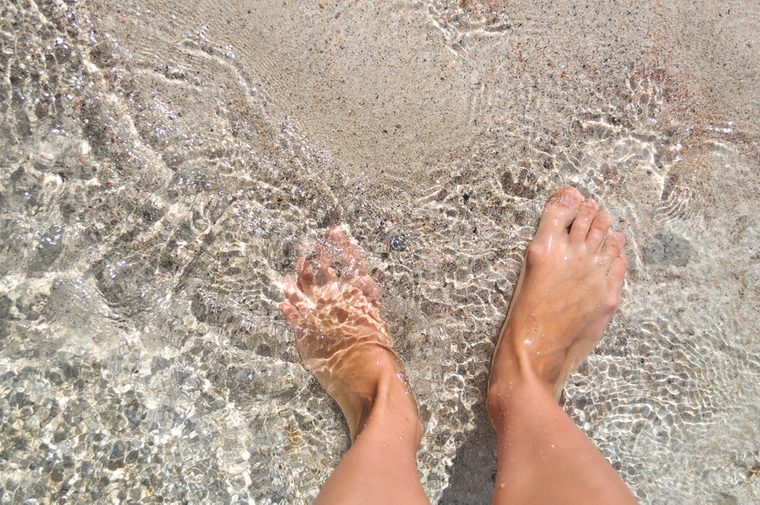
Foot infections
Sure, you pay attention to what you eat… but where you step? Dr. Yamauchi discourages travelers from wearing open-toed shoes because there are several types of infections you can pick up. The ones you’re familiar with—such as athlete’s foot and toenail fungus—but also ringworm, and even parasites like larva migrans, a hookworm. “Often times they’re in the sand at the beach; the worm actually penetrates the bottom of the feet and crawls around under the skin causing an itchy rash,” he explains. Keep your feet covered, and to manage excessive perspiration from warmth and humidity (ideal for fungal growth), try to alternate shoes every day and sprinkle on foot powder to keep the feet dry, Dr. Yamauchi suggests.
Another concern at the beach: Look out for these 8 ways you’re putting yourself at risk of heat stroke without realizing it.
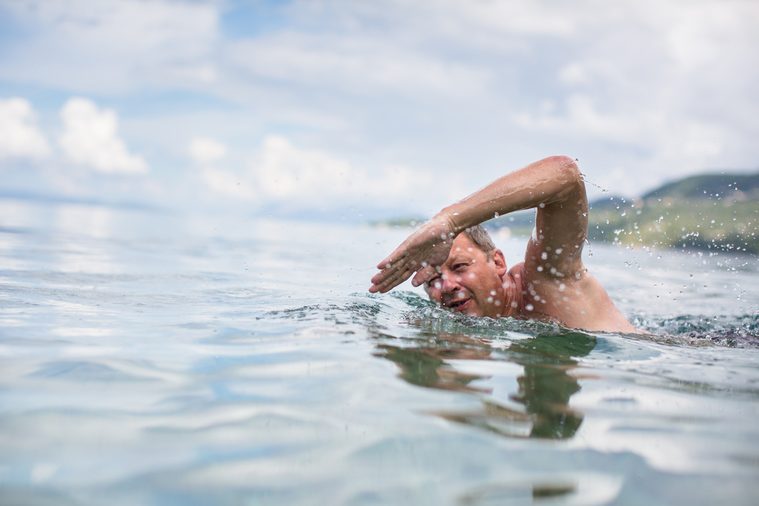
Swimmer’s itch
While you may have battled swimmer’s ear, swimmer’s itch is something else entirely. According to Dr. Greuner, travelers heading to Central and South America should be wary of murky bodies of water. The “itch” is caused by microscopic parasites that infect the skin. Aquatic snails carry the parasites, releasing them in fresh and salt water—they can be found in lakes, ponds, and the ocean. You’ll know right away if you’ve been hit, as the parasites cause an allergic rash and raised bumps. If you do get a rash? Here’s how to identify 14 of the most common skin irritations.
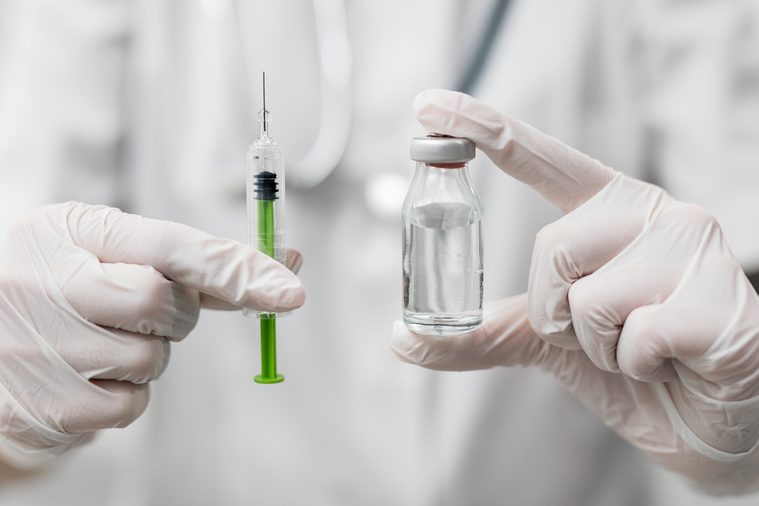
Hepatitis A
This foodborne illness spreads through contaminated food—usually by a worker who didn’t thoroughly wash his or her hands post-toilet, says Dr. Miller. The best way to prevent it yourself is with a series of vaccinations prior to your departure date. And that’s a precaution you may want to take seriously; this virus will attack your liver, resulting in fever, abdominal pain, fatigue, and yellow jaundice, and it can last for months if left untreated. “One hepatitis A vaccine provides travelers with 95% protection within 14 days. A second vaccine, six months later, completes the series and provides 99 percent protection for life,” explains Dr. Miller. It’s just one of the travel vaccinations every traveler should know about.
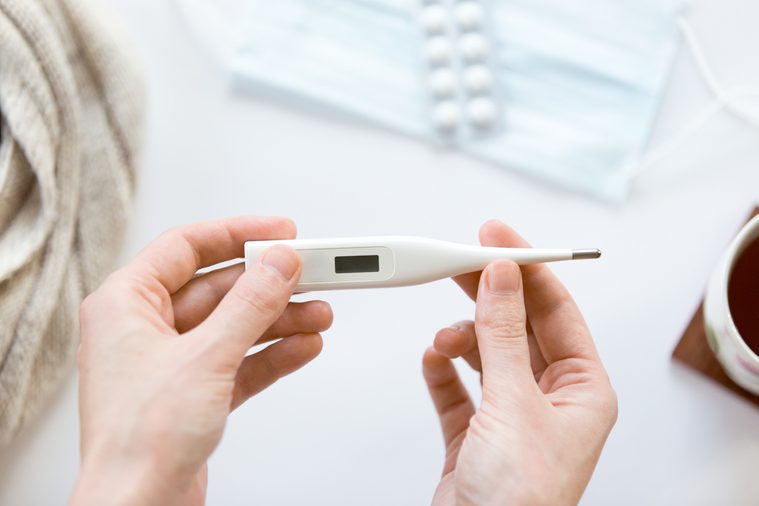
Typhoid fever
Uncommon in industrialized areas such as the United States, Canada, western Europe, Australia, and Japan, typhoid fever is a concern nearly everywhere else on the map. The most likely place to be infected is Southeast Asia, says Dr. George. Another bacteria that is spread through contaminated food or water, typhoid fever can lead to high fever, fatigue, weakness, stomach pains, headaches, loss of appetite, constipation or diarrhea, and rashes; left untreated, the infection can lead to internal bleeding and possibly death. “Typhoid fever is treated with antibiotics and can be diagnosed through blood or stool tests,” he explains. To protect yourself, consider getting vaccinated before you travel. Typhoid fever is one of 15 diseases you probably thought were gone—but they’re not.
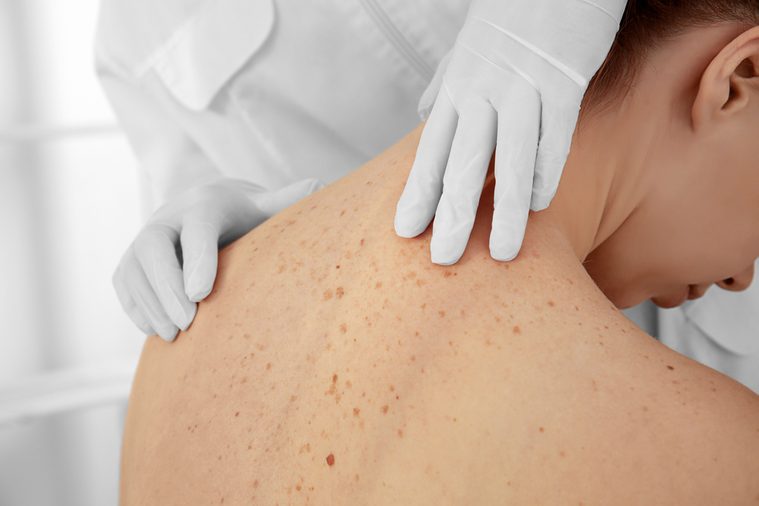
Skin parasites
Mosquitoes aren’t the only biting bugs you have to worry about, warns Dr. Yamauchi. There’s a variety of skin parasites that can cause everything from ulcers to organ failure, which is why he recommends using insect repellent regularly. One worrisome parasite is leishmaniasis—spread by sand flies, they can form ulcers on the skin and damage your spleen and liver. Here’s the best way to treat every type of bite, including flea bits.